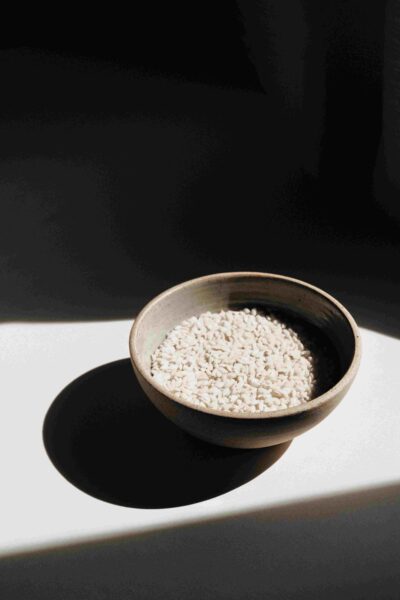Now that Grandpa is dead we can finally eat sushi again. We leave the burial with our hands folded over our stomachs, which are already gurgling in anticipation of the blushing, marbled belly and firm, silver-white flesh.
In the funeral limo, driving home, one of us retells the story of how when Grandpa was young, a unit of Japanese soldiers occupied his family’s apartment when Japan invaded Hong Kong. They swept his calligraphy brushes and rice paper sheets to the floor and unpacked their fish on the kitchen table; he learned to refer to streets by their Japanese names; his father stood in line for rice rations even as they watched the soldiers sling bulging sacks in and out of their old bedrooms. We pull into the driveway each remembering what we’d told Grandpa when we were young: if it upset him, we wouldn’t.
At work events we shook our heads regretfully at the spicy tuna bites; at restaurants, we made do with edamame and rice. It was our small sacrifice for Grandpa, who’d taught us how to write Chinese characters, how we shouldn’t touch the brush to paper until the hairs lay perfectly smooth, all the extra ink wrung back into the inkwell for a later stroke.
“Our grandpa could’ve been a painter,” we used to brag, before we understood why he wasn’t.
We still need to split up Grandpa’s remaining belongings, his humble jetsam of books, clothes, half-finished hobby paintings. But now we deserve a treat. We skip over the udon and teriyaki sections to find the party trays. Number four comes with albacore, hamachi, tuna, salmon, snow-crab, yellowtail. Number six has all that and some pieces with roe.
“I love ikura,” someone says, which lets us ask, “How do you know?” and then more: Haven’t you been to Tokyo? What did you eat there? I’ve always wondered why your kitchen had sushi mats in your bottom drawer. How did you know that Hana delivers?
Nervous laughter, and then, as if someone had slit open the bottom of a bag of rice, an outpouring. Some of us are guiltier than others: a girlfriend had surprised us with a reservation at an omakase restaurant in the West Village and we liked how things were going too much to demur. Others regularly ordered late-night temaki to their apartments. “I never eat it unless someone asks me to,” some of us claim. “I never buy it from a restaurant; I just make it at home.” We survey the moral high ground until the mackerel sours in our mouths. Does ceviche count? Tuna tartare? We go around until everyone confirms: no one has kept their promise.
We tell the story of when Grandpa found us huddled around a Hana Sushi menu, trying to figure out how to dial the number from his curly-corded phone. He’d yanked the plug from the wall. “Not in this house,” he said, the only time he’d ever raised his voice at us.
“Sushi, sushi,” we’d sing-songed. “Grandpa hates sushi!”
“In Hong Kong, you would be in trouble, helping the Japanese,” said Grandpa. The telephone cord trembled in his hand. We ate mustard greens and steamed pork for dinner that night. We remember because it was the first time we had been asked to go without, our excess denied.
We’re full before the party tray has emptied, so we fill the fridge with Tupperware before going to bed. Divvying up his things can wait until morning. In his diary, which one of us will claim and eventually translate, we’ll read how he could only save two shirts when fleeing the city, how he waited until his new closet was full to buy an inkstick.
We wake together in the middle of the night, all our stomachs gurgling again, and put on our shoes. We load ourselves into the funeral limo whose rental period is up tomorrow afternoon because sometimes we can keep something longer than needed or not at all. We navigate deserted suburban streets to the cemetery, where hours ago we’d just seen sod tamped into his grave like plaster into a dent. We pull over at a 7-Eleven on the way, and we press the forlorn California rolls and salmon sashimi to our chests.
The headstone is illegible in the darkness, but we spread a blanket in front of what must be his plot, strike a match over a mess of chopsticks and paper chopstick wrappers. As we add in the small trays, the fish sears, the rice crisps. The flimsy plastic grass separating the wasabi and ginger curls like fingers around the soy sauce packets. We are not sure if we are asking for permission or forgiveness. We tell the story of how when Grandpa was young, he knelt on the concrete kitchen floor to practice painting, coaxing feathered black forests and sheer gray cliffs out of sheets of newspaper because that was all he could find. One day, a soldier leaning his elbows lazily on the table asked if Grandpa would teach him. For a cup of rice, he offered.
“Why don’t you just make me?” said Grandpa, clutching his inkwell, white-knuckled.
“I could,” said the soldier, thoughtfully brushing his hand over his rifle. “But I’m asking.”
Coughing gently in the smoke, we tell the story of how Grandpa walked miles that day to the guerilla resistance camp, headquartered in an old church, to ask whether it was treasonous to trade a lesson for extra rice. How the next morning, when he watered the rice up to his brown-again knuckle, and opened the pot after an interminable half-hour, and tamped the cooked rice into a porcelain bowl, floral-smelling and snow-soft, he thought, despite his hunger, only of the guerilla commander’s tired shrug, his mottled hands in his graying hair, and his heavy sigh. How much heavier a choice weighed than a rule. How on his walk home the sun clung to the horizon like a drop of ink on a brush.



 The core workshop of SmokeLong Fitness is all in writing, so you can take part from anywhere at anytime. We are excited about creating a supportive, consistent and structured environment for flash writers to work on their craft in a community. We are thrilled and proud to say that our workshop participants have won, placed, or been listed in every major flash competition. Community works.
The core workshop of SmokeLong Fitness is all in writing, so you can take part from anywhere at anytime. We are excited about creating a supportive, consistent and structured environment for flash writers to work on their craft in a community. We are thrilled and proud to say that our workshop participants have won, placed, or been listed in every major flash competition. Community works.